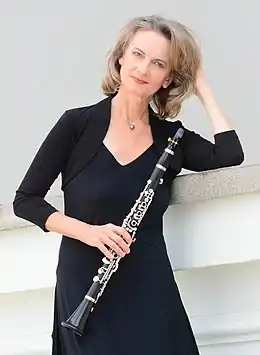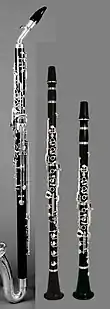Sabine Meyer
Sabine Meyer (born 30 March 1959)[1] is a German classical clarinetist.
Sabine Meyer | |
|---|---|
 Photo 2019 | |
| Background information | |
| Born | March 30, 1959 Crailsheim, Germany |
| Genres | Classical music, contemporary music |
| Occupation(s) | Solo clarinetist and Professor for Clarinet |
| Instruments | Clarinet (German system) |
| Years active | 1983–present |
| Labels | EMI Classics, Warner Classis, Avi-music, Deutsche Grammophon |
| Associated acts |
|
| Website | www |
| Teachers while studying: Otto Hermann, Stuttgart and Hans Deinzer, Hannover Well-known former students approximately 60 | |
| Awards: ECHO Klassik Prize, eight-time winner, Order of Merit of the Federal Republic of Germany, Cross of Merit 1st Class, Order of Merit of Baden-Württemberg, several art and music awards Discography/Streaming: Konzertdirektion Hans Ulrich Schmid, Hannover | |
| Personal / Private Spouse, children: Lübeck, | |
Biography
Born in Crailsheim, Baden-Württemberg, Meyer began playing the clarinet at an early age. Her first teacher was her father, also a clarinetist. She studied with Otto Hermann in Stuttgart and then with Hans Deinzer at the Hochschule für Musik und Theater Hannover, along with her brother, clarinetist Wolfgang Meyer, and husband, clarinetist Reiner Wehle, who played later in the Munich Philharmonic.[2] She began her career as a member of the Bavarian Radio Symphony Orchestra and the Berlin Philharmonic, where her appointment as one of the orchestra's first female members caused controversy.[3] Herbert von Karajan, the orchestra's music director, hired Meyer in September 1982, but the players voted against her at the conclusion of her probation period by a vote of 73 to 4.[4] The orchestra insisted the reason was that her tone did not blend with the other members of the section, but other observers, including Karajan, believed that the true reason was her gender. In 1983, after nine months, Meyer left the orchestra to become a full-time solo clarinetist.[5]
In addition to her work as a soloist, and a band member in general, Sabine Meyer is a committed player of chamber music and plays all styles of classical music. She was a member of the Trio di Clarone along with her brother and husband who have recorded many CDs.[6][7] Meyer and her wind quintet have worked as members of the Lucerne Festival Orchestra with Claudio Abbado.[8]
By the 1990s, Meyer had become a prominent solo clarinetist, recording regularly and exclusively for the EMI label.[9] These EMI recordings include a CD of French music for Clarinet and Piano with Oleg Maisenberg, entitled French Recital. A disc of clarinet concertos by Ludwig Spohr and Franz Krommer was released in July 2007, for which she collaborated with her student Julian Bliss.
Meyer and her husband have two children. From 193 to the summer semester 2020 she shared a professorship at Musikhochschule Lübeck, in Schleswig-Holstein, Germany, and live in Lübeck.[2] Her husband's successor is her former student Jens Thoben. Her clarinet students have also included Shirley Brill, Shelly Ezra, Boglárka Pecze, Annelien Van Wauwe, Sebastian Manz and Taira Kaneko.
Instruments

Sabine Meyer plays the clarinet and basset clarinet in B♭ and A, as well as a basset horn in F, all made of grenadilla by Herbert Wurlitzer, and clarinets in B♭ and in A made of boxwood, manufactured by Schwenk & Seggelke, which she mainly uses in chamber music. In 1984, Meyer had commissioned Wurlitzer to build a basset clarinet (in A) for her, not a historical replica, but a modern hitherto only occasionally built instrument. Since then, she has been playing the clarinet concerto by Mozart (and his clarinet quintet) in a reconstructed version.
Awards
- 1996 Niedersachsenpreis for culture
- 1997 Member of the Free Academy of the Arts Hamburg
- 2001 Brahms Prize by the Brahms Society Schleswig-Holstein[10]
- 2004 Art Award of the Federal State of Schleswig-Holstein
- 2008 French order Chevalier des Arts et des Lettres[11]
- 2010 Order of Merit of Baden-Württemberg[12]
- 2013 Order of Merit of the Federal Republic of Germany, Cross of Merit 1st Class[13]
- various ECHO Klassik Prize, eight-time winner[14]
Selected Recordings
- 1983: Mozart: Clarinet Quintet in A major K.V. 581, with the Philharmonia Quartet Berlin, Denon PSM 38C37-7038
- 1985–1986: Weber: Clarinet Concerto No. 1, Clarinet Concerto No. 2, Concertino, with Herbert Blomstedt and Dresden Staatskapelle, and Clarinet Quintet, with Jörg Faerber and Württembergisches Kammerorchester Heilbronn, EMI Classics 7243 5 67989 2 2.
- 1988: Mozart: Clarinet Quintet, with Wiener Streichsextett, EMI Classics 7243 5 67648 2 8.
- 1990: Mozart: Clarinet Concerto, Sinfonia concertante in E flat K. 297b, with Hans Vonk and Dresden Staatskapelle, EMI Classics 7243 5 66949 2 7.
- 1995: Carl Stamitz: Clarinet Concerto No. 1, Clarinet Concerto No. 7, Concerto for basset horn, Concerto for Clarinet and Bassoon, with Sergio Azzolini (Bassoon) and Iona Brown and Academy of St. Martin in the Fields, EMI Classics 7243 5 55511 2 2.
- 1996: A Night at the Opera, with Franz Welser-Möst and Orchester der Oper Zürich, EMI Classics 7243 5 56137 2 1.
- 1999: Mozart: Clarinet Concerto, Debussy Premiere Rapsodie, Takemitsu Fantasma/Cantos, with Claudio Abbado and Berliner Philharmoniker, EMI Classics 7243 5 56832 2 9.
- 1999: Brahms: Clarinet Quintet, with Alban Berg Quartett, EMI Classics 7243 5 56759 2 7.
- 2007: Saint-Saëns: Clarinet Sonata, Poulenc: Clarinet Sonata, Devienne: Clarinet Sonata No. 1, Milhaud: Scaramouche, with Oleg Maisenberg, EMI Classics 0946 3 79787 2 6.
- 2007: Franz Krommer: Concerto for two clarinets, with Julian Bliss, Spohr: Clarinet Concerto No. 4, (Clarinet) and Kenneth Sillito and Academy of St. Martin in the Fields, EMI Classics 0946 3 79786 2 7.
- 2007: Nielsen Clarinet Concerto, Wind Quintet, with Simon Rattle and Berliner Philharmoniker, EMI Classics 0946 3 94421 2 6.
References
- Kunz, Roland (28 March 2019). "Die Klarinettistin Sabine Meyer wird 60". swr.de (in German). Stuttgart: Südwestrundfunk. Retrieved 9 December 2019.
- Hannemann, Matthias (29 May 2007). "Solo für Klarinette". Frankfurter Allgemeine Zeitung (in German). Frankfurt. Retrieved 9 December 2019.
- UPI (8 January 1983). "Karajan and orchestra clash over clarinetist". The New York Times. New York City. Retrieved 9 December 2019.
- "Schlag ins Konto". Der Spiegel (in German). Hamburg. 10 January 1983. Retrieved 9 December 2019.
- Schwarz, Elisabeth (28 May 2018). ""Daneben verblasst erstmal alles": Sabine Meyer über Mozarts Bassettklarinettenkonzert". bachtrack.com. Bachtrack Ltd. Retrieved 9 December 2019.
- Zimmerlin, Alfred (4 October 2013). "Avantgarde der Romantik". Neue Zürcher Zeitung (in German). Zürch. Retrieved 9 December 2019.
- Obiera, Pedro (7 March 2017). "Kammermusik voller Poesie und Leidenschaft". Westdeutsche Allgemeine Zeitung (in German). Essen. Retrieved 9 December 2019.
- Service, Tom (22 August 2007). "The maestro". The Guardian. Retrieved 20 June 2008.
- Andrew Clements (6 September 2007). "Nielsen: Flute Concerto; Clarinet Concerto; Wind Quintet, Pahud/ Meyer/ Berlin Philharmoniker/ Rattle". The Guardian. Retrieved 18 October 2020.
- "Past winners". Website of the Brahms Society Schleswig-Holstein. Retrieved 16 May 2019.
- Reservix, Sabine Meyer
- Staatsministerium Baden-Württemberg. "Verdienstorden des Landes Baden-Württemberg Liste der Ordensträger 1975 – 2018" (PDF). stm.baden-wuerttemberg.de. Retrieved 4 April 2012.
- Communication from the Office of the President of Germany, Retrieved 4 October 2013
- "Sabine Meyer". rudolf-oetker-halle.de.
External links
![]() Media related to Sabine Meyer at Wikimedia Commons
Media related to Sabine Meyer at Wikimedia Commons
- Official website
- Literature by and about Sabine Meyer in the German National Library catalogue
- Sabine Meyer discography at Discogs

- William Osborne, "Art Is Just an Excuse: Gender Bias in International Orchestras"
- Interview with Sabine Meyer and Reiner Wehle, 15 July 1994
- Sabine Meyer Biografie at Salzburger Festspiele (in German)
- W. A. Mozart, Clarinet Quintet on YouTube
- W. A. Mozart, Clarinet Concerto, from Adagio (performed with basset clarinet) on YouTube
- Weber, First Clarinet Concerto, finale on YouTube
